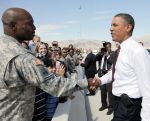by Steven R. Hurst
WASHINGTON (AP)—President Barack Obama kept a promise but took a risk in boldly declaring an end to 7½ years of war in Iraq and asserting that America had turned the page on the costly, divisive conflict.
In relatively brief but politically freighted remarks from the Oval Office on Tuesday night, Obama lavished praise on America’s military men and women, saying they had “stared into the darkest of human creations—war—and helped the Iraqi people seek the light of peace.”
 |
| CAMPAIGN PROMISE FULFILLED—President Barack Obama greet members of the military and their families on the tarmac at Biggs Army Airfield in Texas, Aug. 31. |
Obama’s second address to the nation shifted quickly, however, to politics, with a reminder of his erstwhile opposition to the deeply unpopular war, a position that—in part—fueled his successful run for the White House.
Now, 19 months in office and with the U.S. economy in deep malaise, Obama, who as a candidate opposed the war, blamed President George W. Bush’s invasion of Iraq for having “shortchanged investments in our own people and contributed to record deficits.”
He spoke of a trillion borrowed dollars spent on war over the past decade and asserted that the Bush administration had turned its back on American middle-class families who “find themselves working harder for less, while our nation’s long-term competitiveness is put at risk.”
Those remarks—undoubtedly born out of a bruising congressional election season—reflect fears that his fellow Democrats could lose their majority hold on the House and, perhaps, the Senate.
Beyond the politics, however, the U.S. troop withdrawal coincides with a continuing political stalemate in Iraq, with no assurance the government there can hold together in the face of a diminished but still dangerous Sunni Muslim insurgency.
In fact, six months after national elections, politicians in Baghdad still have not been able to form a new government. While the administration claims it expected that kind of delay, Obama’s words last Tuesday night voiced an underlying anxiety that Iraq still could fall backward into the kind of sectarian violence that ravaged the country in 2006 and 2007.
“Tonight, I encourage Iraq’s leaders to move forward with a sense of urgency,” Obama said, “to form an inclusive government that is just, representative and accountable to the Iraqi people.
Even as he momentously announced he was keeping his withdrawal promise in Iraq, Obama finds himself pulled two ways on warfare. He noted there “are those who are understandably asking tough questions about our mission” in Afghanistan, where Obama has boosted troop strength to near 100,000.
The intense fighting against al-Qaida’s Taliban allies has killed 19 U.S. service members in only four days.
Regardless, Obama said, the difference in the wars is vast. Winning the nine-year-old Afghan conflict remains a fulcrum of American security.
“As we speak,” Obama said, “al-Qaida continues to plot against us, and its leadership remains anchored in the border region of Afghanistan and Pakistan.”
In announcing the U.S. troop build up in Afghanistan late last year, Obama also promised that American forces would begin leaving there next summer—as the situation allowed.
Last Tuesday night may prove to have been a warm-up for a far more momentous—and perhaps far more difficult—speech 12 months hence.
(EDITOR’S NOTE—Steven R. Hurst was Baghdad bureau chief for The Associated Press from 2005-07.)